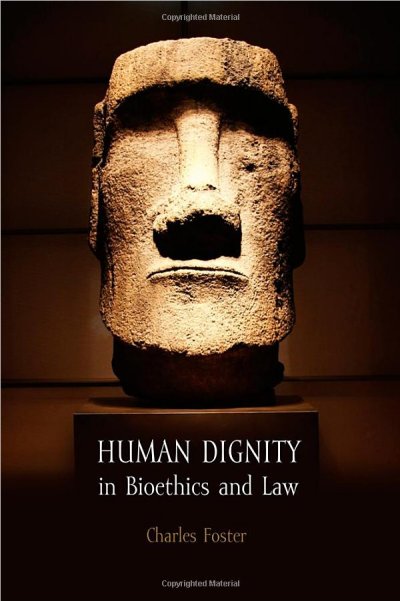Catholic Medical Quarterly Volume 62(3) August 2012, page 42
Book Review
Human Dignity in Bioethics and Law
by Charles Foster,
Hart Publishing
ISBN 978-1-84946-177-1
 The
central thesis of this highly readable book is that dignity is
really the fundamental principle in bioethics. Autonomy,
beneficence, non-maleficence and justice ("the four principles")
are to be regarded as second order principles only tracing their
origins back to dignity. For too long, the four principles of
Beauchamp and Childress have dominated the field of bioethics,
although they have never been entirely satisfactory. Dignity,
argues Foster, is what really matters because it is what is
common to all human beings. The author convinces us of his
central thesis with excellent use of current legal and ethical
issues in the literature.
The
central thesis of this highly readable book is that dignity is
really the fundamental principle in bioethics. Autonomy,
beneficence, non-maleficence and justice ("the four principles")
are to be regarded as second order principles only tracing their
origins back to dignity. For too long, the four principles of
Beauchamp and Childress have dominated the field of bioethics,
although they have never been entirely satisfactory. Dignity,
argues Foster, is what really matters because it is what is
common to all human beings. The author convinces us of his
central thesis with excellent use of current legal and ethical
issues in the literature.
The author examines some practical issues including informed consent, abortion and euthanasia. Those of us who follow the Catholic tradition will arrive at a different conclusion to that of the author on some issues. For example, Foster accepts that the foetus is to be treated with dignity and that there is no right to abortion per se but when there is competition between the mother's life and that of the foetus then abortion is justified. He writes that " The dignity analysis that I have been urging has no difficulty at all with that conclusion, and the Catholic pro-life lobby's disquiet with the decision is (in the light of the Catholic Church's ancient reliance on the principle of double effect to justify abortion when the mother's life is threatened), incomprehensible." However the principle of double effect differentiates between direct and indirect abortion. It is surely because of the absolute value of human dignity in the Catholic tradition that direct abortion is deemed immoral.
On end of life issues, Foster puts forward an excellent case against the planned suicide of people like Dianne Pretty and Debbie Purdie. But he believes that the intentional killing of Tony Bland was acceptable in principle. Yet Foster goes on to write that people in PVS ought to be treated with dignity and that it is dangerous to claim that human dignity is somehow eroded by disease.
I do not think that Foster does justice, so to speak, to the idea of dignity proposed by Luke Gormally and Leon Kass. For example, he claims that " a congenitally incapacitated child" cannot on Gormally's view have any existential dignity. Those of us familiar with Gormally's work will disagree.
Overall, this is an interesting and readable work. The essential problems with the four principles are discussed and we are left convinced that dignity is central to bioethical discourse.
